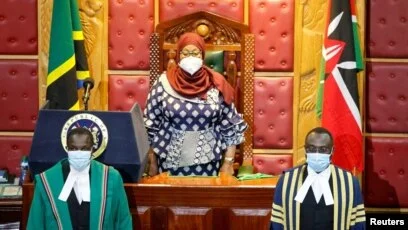Tanzanian President Samia Suluhu Hassan announced the lifting of a ban on political rallies, a policy instituted by her predecessor, John Magufuli, who died in March 2021.
Speaking to party leaders at State House, Hassan stated, “The ban on political rallies is now lifted,” urging politicians to practice “civilized politics” while assuring government support for rally security.
She encouraged constructive criticism to address national challenges for the benefit of Tanzanians.
Magufuli’s Legacy of Repression
Magufuli, nicknamed “Bulldozer” for his uncompromising stance, banned political rallies early in his 2015–2021 presidency, claiming it was time for work, not politics.
Critics, however, argued the ban disproportionately targeted opposition groups, while the ruling Chama Cha Mapinduzi (CCM) party faced no such restrictions.
Opposition rallies, such as a 2018 Chadema event, were violently dispersed, with leaders like Freeman Mbowe facing charges of unlawful assembly and inciting violence.
Magufuli’s tenure saw Tanzania’s democratic reputation erode, marked by media bans and arrests of opposition figures.
Cautious Optimism from Opposition
Opposition leaders responded cautiously to Hassan’s announcement. Freeman Mbowe, Chadema’s leader who was imprisoned for seven months on terrorism charges under Hassan, welcomed the decision but emphasized the need to monitor its implementation by government officials.
Zitto Kabwe, another opposition figure, called the move a “huge” step toward reform, describing it as cleaning up an “illegal presidential decree” via a WhatsApp message to AFP.
Hassan’s Reform Efforts
As Tanzania’s first female president, sworn in after Magufuli’s sudden death, Hassan initially raised hopes for democratic renewal by reopening banned media outlets and engaging with opposition leaders.
However, the 2021 arrest of Mbowe tempered optimism, with critics arguing that more robust reforms are needed to restore Tanzania’s democratic credentials.
Human Rights Watch researcher Oryem Nyeko urged Hassan to take “concrete action” to ensure a fair democratic playing field.
Broader Implications
The lifting of the rally ban is seen as a significant step toward reversing Magufuli’s autocratic policies, but its success hinges on consistent implementation and broader reforms.
Observers note that Tanzania’s political landscape remains fragile, with ongoing concerns about freedom of expression and assembly.
Hassan’s commitment to fostering open dialogue could signal a turning point, but sustained efforts are needed to rebuild trust in democratic institutions.






